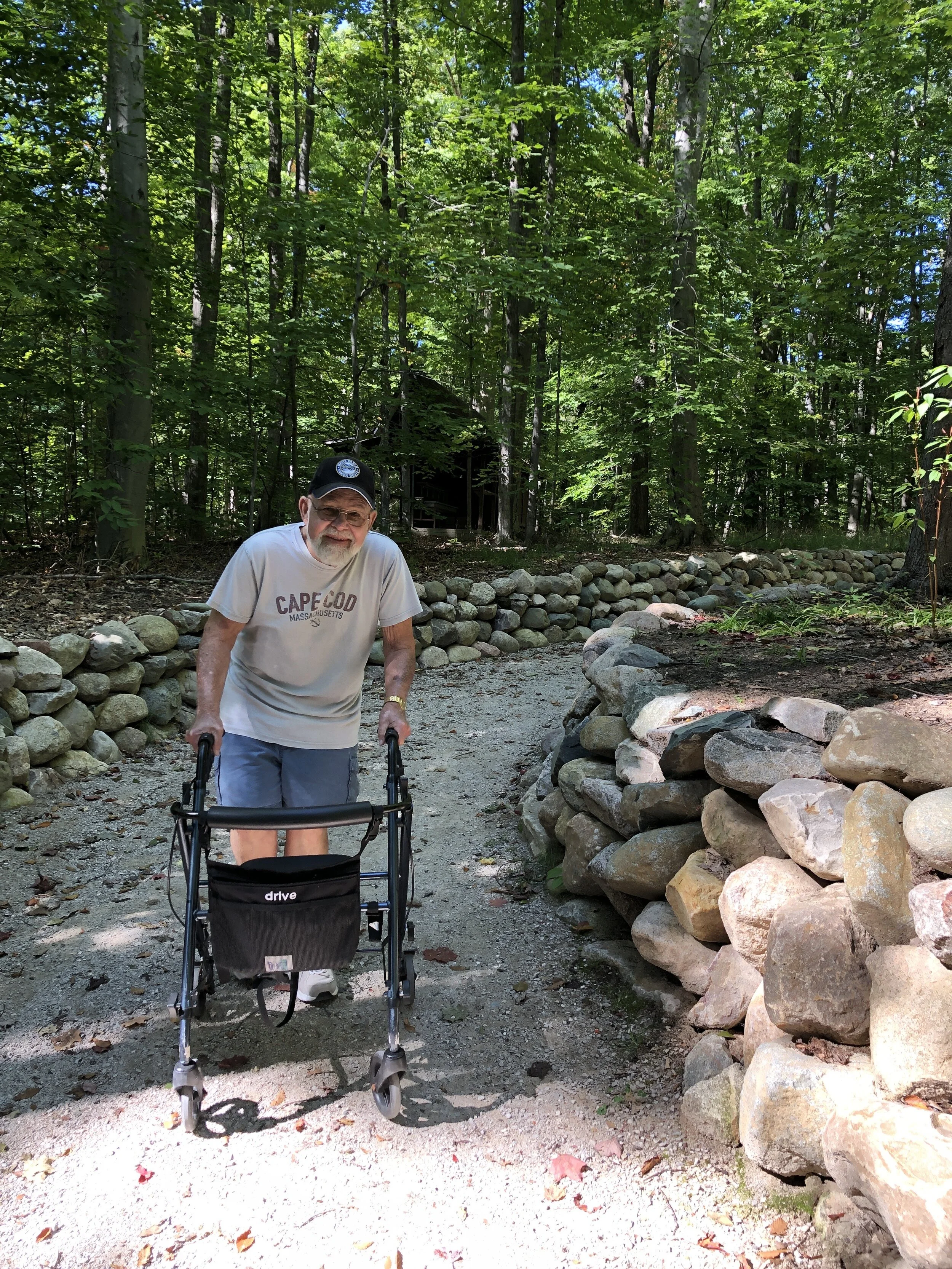Lately, things I wouldn’t have expected cause me to almost cry. Like yesterday, Jerry and I tried our first accessible trail, close to Traverse City. We’ve walked paved trails before, but this one is a real trail through the woods, with an aggregate base that isn’t too hard to push a walker on. I should mention, Jerry can get by with a cane for short distances, but increasingly needs a walker for anything more.
It’s a beautiful trail, the accessible part over a mile long, that leads to two lakes, including an overlook at the small one and a section of dock out from the large one. I can walk just fine, which maybe allows me to see how this is, from a little psychological distance. The details that become necessary to maneuver where others would just move on by. It’s the attention to detail here that touches me. Many benches have been placed along the way. You can stop and rest as you need to. There are a couple of toilets, the large kind you could get a wheelchair in. But the detail that almost brings me to tears is the way the trail has been dug out and lined with rocks to change the grade to a much easier slope. It must have been a huge job. Just for the few people who need it.
I wouldn’t have thought about this before. About the details, yes, but also about what it means to be able to walk in the woods when otherwise, you couldn’t. About what it’s like to be shut out of what I think of, at least, as one of life’s great pleasures. I notice ramps, curbless curbs. I think of those who fought for the ADA that opened the world for handicapped people.
I notice the way, when we meet people on the trail—the more mobile people—there’s a different quality to their greeting. Seeing someone struggle must dig deep into our psyche. The expressions say, “I’m so sorry. I would help if I could. I realize how fortunate I am to be able to move along quickly. I want you to know I see you.” No one doesn’t register a fleeting caring.
Maybe occasionally the look may say, “I am supposed to be caring, so okay, here is my caring expression.” And of course I know not every person with a walker is greeted with love. But I have seen this over and over, enough to think it’s the norm. It is natural to care about people, about birds and bears and turtles. We are intimately connected to each other.
The poem I chose this week for my newspaper column might be good here:
Small Kindnesses
I’ve been thinking about the way, when you walk
down a crowded aisle, people pull in their legs
to let you by. Or how strangers still say “bless you”
when someone sneezes, a leftover
from the Bubonic plague. “Don’t die,” we are saying.
And sometimes, when you spill lemons
from your grocery bag, someone else will help you
pick them up. Mostly, we don’t want to harm each other.
We want to be handed our cup of coffee hot,
and to say thank you to the person handing it. To smile
at them and for them to smile back. For the waitress
to call us honey when she sets down the bowl of clam chowder,
and for the driver in the red pick-up truck to let us pass.
We have so little of each other, now. So far
from tribe and fire. Only these brief moments of exchange.
What if they are the true dwelling of the holy, these
fleeting temples we make together when we say, “Here,
have my seat,” “Go ahead — you first,” “I like your hat.”
-- Danusha Laméris, from Bonfire Opera (University of Pittsburgh Press 2020).
P.S. There is still, but barely, time to sign up to join me for this workshop! Beginners, experienced writers, and everyone in between.
Crafty Moves: How to Do Good Camera Work Inside the Poem
Monday, October 11, 6-7:30 pm, CT
$49 USD* — REGISTER/PAY HERE
Participation via Zoom link



